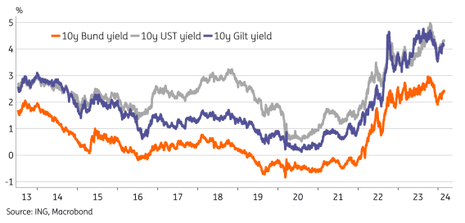Introduction: Hunt warned pound would suffer if he misreads the markets
Good morning, and welcome to our rolling of business, the financial markets, and the world economy.
With just over week to go until the budget, Jeremy Hunt is being warned not to risk unfunded tax cuts that could cause ructions in the financial markets.
The chancellor is understandably keen to offer some pre-election sweeteners, in the hope of closing the gap with Labour. City economists, though, warn that there may not be as much fiscal firepower to play with as Hunt would like.
ING, the Dutch banking group, estimates that the money available for tax cuts â so-called âheadroomâ â now equals £18bn. Thatâs up from £13bn in November, but lower than estimated a few weeks ago, as the City has cut it expectations for Bank of England rate cuts.
This headroom is the amount of money the chancellor can spend, and still hit his fiscal rule â to have debt falling, as a share of GDP, in five years time.
£13bn could, potentially, allow the chancellor to cut income tax by 2p in the pound â as a 1p cut to the basic rate of income tax is slated to cost roughly £7bn/year. That wouldnât leave very much left over, though.
As INGâs developed market economist, James Smith, puts it in a research note this week:
The situation is tight. And itâs possible our estimate of headroom is too optimistic.
What about cutting spending, though, to free up money for tax cuts? ING says such spending restraint looks âunrealisticâ, given the governmentâs current plans already imply more painful austerity for departments.
Talk of tax cuts will revive visions of the 2022 mini-budget debacle, when Kwasi Kwarteng crashed the pound and the bond markets by announcing unfunded tax cuts, without any scrutiny from the independent Office for Budget Responsibility.
The situation is different this time â the OBR will give its verdict as soon as Hunt sits down next Wednesday after delivering the budget.
Smith says that funding tax cuts today with unrealised and potentially challenging spending cuts tomorrow may âraise a few eyebrows among investorsâ, but in reality this wouldnât be a new approach.
Smith told The Guardian:
âThe savings earmarked so far are already very challenging and further savings appear unrealistic.
Talk of tax cuts inevitably triggers memories of the 2022 mini budget crisis, where UK government borrowing costs rose precipitously following a package of unfunded measures designed to boost growth.â
He warns, though, that fresh tax cuts could still apply some upward pressure on yields â the measure of Britainâs borrowing costs.
INGâs gauge of risk premium in the government bond market suggests investors are still keeping an eye on UK fiscal risk â with UK borrowing costs higher than Germanyâs, but in line with the US.


Sizable cuts to income tax would add further impetus for the Bank of England to keep interest rates on hold a little longer, ING predicts, meaning more pain for borrowers and a delay to rate cuts.
ING reports that market conditions in the currency market are calm, which should please Hunt.
They say:
When it comes to FX markets, current market conditions could not be more different than those that prevailed at the height of the Liz Truss debacle.
But, they warn that if the chancellor was to âmisread the mood of gilt investors and cause another upsetâ, sterling would take a hit.
ING add:
Short-term models suggest a 2% sell-off in sterling could happen quite easily were investors to again demand a risk premium of sterling asset markets.
The Institute for Fiscal Studies are pointing out this morning that UK taxes are heading to record-high levels, as a share of national income.
They warn that the public finances face an âunhappy outlookâ, with debt high and rising, and barely on track to start falling in five yearâs time.
In a warning shot to Hunt, they say:
Unless the Chancellor is willing to spell out where the cuts will fall, the temptation to scale back provisional spending plans further to âpay forâ new tax cuts should be avoided.
Weâll hear more from the IFS this morning, as they present their analysis of Huntâs options ahead of the budget.
The agenda
-
8am GMT: Kantarâs latest UK supermarket sales and market share data
-
10am GMT: Institute for Fiscal Studies presents Spring Budget 2024: the Chancellorâs options
-
1.30pm GMT: US durable goods orders for January
-
1.40pm GMT: Bank of England deputy governor Dave Ramsden gives keynote address at Association for Financial Markets in Europeâs Bond Trading, Innovation and Evolution Forum
Key events
Jeremy Hunt “plans national insurance cut and vape tax for budget”
The Times are reporting this morning that Hunt will use next weekâs budget to cut national insurance, rather than income tax, and annnounce a new levy on vaping.
They say the budget on March 6 is expected to be far more limited than last yearâs autumn statement, as forecasts suggest he will have much less money to spend than expected.
According to The Times:
The two main tax cuts expected in the budget are a 1 percentage-point reduction in employee national insurance, at a cost of about £4.5 billion a year, and an extension of the fuel duty freeze at a cost of £1 billion a year.
Full story: Jeremy Huntâs âdubiousâ financial planning lacks credibility, says IFS

Phillip Inman
Jeremy Huntâs financial planning is âdubiousâ and âlacks credibilityâ and the chancellor should not announce tax cuts in next weekâs budget if he cannot lay out how he will fund them, an economic thinktank has said.
The Institute for Fiscal Studies (IFS) calculates that Hunt would need to find £35bn of cuts from already threadbare public services if he plans to use a Whitehall spending freeze to pay for pre-election giveaways.
A fresh round of austerity in unprotected departments would boost the chancellorâs war chest for tax cuts, the independent tax and spending watchdog said, but an increase from an expected £15bn of headroom to about £50bn over the next five years would come at a high cost.
The IFS called for vague pledges to reduce spending to be replaced with concrete plans on where savings could be achieved, given the likely hardship and difficulty of achieving further reductions. Its report said:
âThe economic case for tax cuts is weak. The public finances remain in a poor position.
More here:
Introduction: Hunt warned pound would suffer if he misreads the markets
Good morning, and welcome to our rolling of business, the financial markets, and the world economy.
With just over week to go until the budget, Jeremy Hunt is being warned not to risk unfunded tax cuts that could cause ructions in the financial markets.
The chancellor is understandably keen to offer some pre-election sweeteners, in the hope of closing the gap with Labour. City economists, though, warn that there may not be as much fiscal firepower to play with as Hunt would like.
ING, the Dutch banking group, estimates that the money available for tax cuts â so-called âheadroomâ â now equals £18bn. Thatâs up from £13bn in November, but lower than estimated a few weeks ago, as the City has cut it expectations for Bank of England rate cuts.
This headroom is the amount of money the chancellor can spend, and still hit his fiscal rule â to have debt falling, as a share of GDP, in five years time.
£13bn could, potentially, allow the chancellor to cut income tax by 2p in the pound â as a 1p cut to the basic rate of income tax is slated to cost roughly £7bn/year. That wouldnât leave very much left over, though.
As INGâs developed market economist, James Smith, puts it in a research note this week:
The situation is tight. And itâs possible our estimate of headroom is too optimistic.
What about cutting spending, though, to free up money for tax cuts? ING says such spending restraint looks âunrealisticâ, given the governmentâs current plans already imply more painful austerity for departments.
Talk of tax cuts will revive visions of the 2022 mini-budget debacle, when Kwasi Kwarteng crashed the pound and the bond markets by announcing unfunded tax cuts, without any scrutiny from the independent Office for Budget Responsibility.
The situation is different this time â the OBR will give its verdict as soon as Hunt sits down next Wednesday after delivering the budget.
Smith says that funding tax cuts today with unrealised and potentially challenging spending cuts tomorrow may âraise a few eyebrows among investorsâ, but in reality this wouldnât be a new approach.
Smith told The Guardian:
âThe savings earmarked so far are already very challenging and further savings appear unrealistic.
Talk of tax cuts inevitably triggers memories of the 2022 mini budget crisis, where UK government borrowing costs rose precipitously following a package of unfunded measures designed to boost growth.â
He warns, though, that fresh tax cuts could still apply some upward pressure on yields â the measure of Britainâs borrowing costs.
INGâs gauge of risk premium in the government bond market suggests investors are still keeping an eye on UK fiscal risk â with UK borrowing costs higher than Germanyâs, but in line with the US.


Sizable cuts to income tax would add further impetus for the Bank of England to keep interest rates on hold a little longer, ING predicts, meaning more pain for borrowers and a delay to rate cuts.
ING reports that market conditions in the currency market are calm, which should please Hunt.
They say:
When it comes to FX markets, current market conditions could not be more different than those that prevailed at the height of the Liz Truss debacle.
But, they warn that if the chancellor was to âmisread the mood of gilt investors and cause another upsetâ, sterling would take a hit.
ING add:
Short-term models suggest a 2% sell-off in sterling could happen quite easily were investors to again demand a risk premium of sterling asset markets.
The Institute for Fiscal Studies are pointing out this morning that UK taxes are heading to record-high levels, as a share of national income.
They warn that the public finances face an âunhappy outlookâ, with debt high and rising, and barely on track to start falling in five yearâs time.
In a warning shot to Hunt, they say:
Unless the Chancellor is willing to spell out where the cuts will fall, the temptation to scale back provisional spending plans further to âpay forâ new tax cuts should be avoided.
Weâll hear more from the IFS this morning, as they present their analysis of Huntâs options ahead of the budget.
The agenda
-
8am GMT: Kantarâs latest UK supermarket sales and market share data
-
10am GMT: Institute for Fiscal Studies presents Spring Budget 2024: the Chancellorâs options
-
1.30pm GMT: US durable goods orders for January
-
1.40pm GMT: Bank of England deputy governor Dave Ramsden gives keynote address at Association for Financial Markets in Europeâs Bond Trading, Innovation and Evolution Forum







